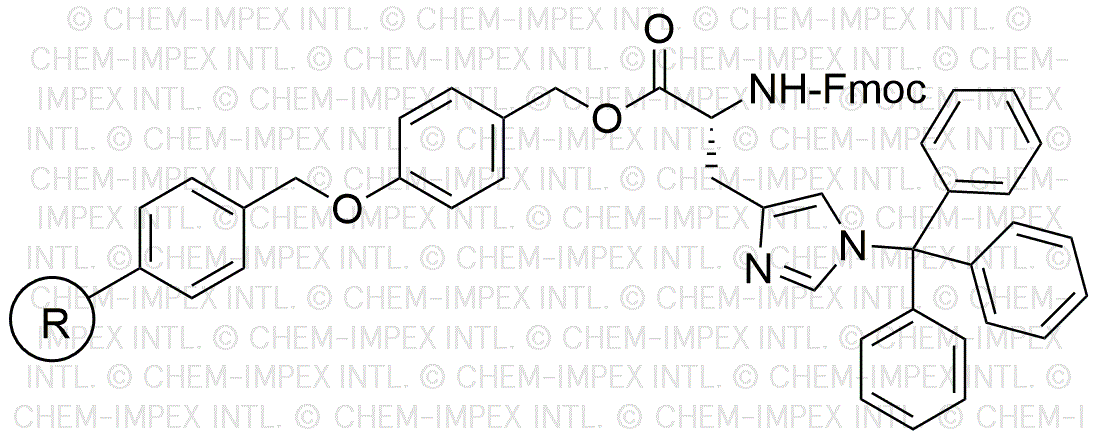Na-Fmoc-Nim-trityl-D-histidine 4-alkoxybenzyl alcohol resin is widely utilized in research focused on:
- Peptide Synthesis: This resin is essential for solid-phase peptide synthesis, allowing researchers to create complex peptides efficiently. Its unique structure facilitates the attachment and detachment of amino acids, streamlining the synthesis process.
- Drug Development: In pharmaceutical research, this resin aids in the development of peptide-based drugs. Its ability to form stable linkages enhances the formulation of therapeutic agents targeting specific diseases.
- Bioconjugation: The resin is used in bioconjugation techniques, where peptides are linked to other biomolecules. This is crucial for creating targeted drug delivery systems, improving the efficacy of treatments.
- Research in Cancer Therapy: Researchers utilize this resin to develop peptides that can inhibit cancer cell growth. Its application in creating specific inhibitors can lead to breakthroughs in cancer treatment.
- Protein Engineering: In the field of protein engineering, the resin is employed to modify proteins for enhanced functionality. This is particularly beneficial in creating proteins with improved stability and activity for various industrial applications.
Información general
Propiedades
Seguridad y normativas
Aplicaciones
Na-Fmoc-Nim-trityl-D-histidine 4-alkoxybenzyl alcohol resin is widely utilized in research focused on:
- Peptide Synthesis: This resin is essential for solid-phase peptide synthesis, allowing researchers to create complex peptides efficiently. Its unique structure facilitates the attachment and detachment of amino acids, streamlining the synthesis process.
- Drug Development: In pharmaceutical research, this resin aids in the development of peptide-based drugs. Its ability to form stable linkages enhances the formulation of therapeutic agents targeting specific diseases.
- Bioconjugation: The resin is used in bioconjugation techniques, where peptides are linked to other biomolecules. This is crucial for creating targeted drug delivery systems, improving the efficacy of treatments.
- Research in Cancer Therapy: Researchers utilize this resin to develop peptides that can inhibit cancer cell growth. Its application in creating specific inhibitors can lead to breakthroughs in cancer treatment.
- Protein Engineering: In the field of protein engineering, the resin is employed to modify proteins for enhanced functionality. This is particularly beneficial in creating proteins with improved stability and activity for various industrial applications.
Documentos
Hojas de datos de seguridad (HDS)
La SDS proporciona información de seguridad completa sobre la manipulación, el almacenamiento y la eliminación del producto.
Especificación del producto (PS)
La PS proporciona un desglose completo de las propiedades del producto, incluida la composición química, el estado físico, la pureza y los requisitos de almacenamiento. También detalla los rangos de calidad aceptables y las aplicaciones previstas del producto.
Certificados de análisis (COA)
Busque certificados de análisis (COA) ingresando el número de lote del producto. Los números de lote y de partida se pueden encontrar en la etiqueta de un producto después de las palabras "Lote" o "Lote".
Número de catálogo
Número de lote/lote
Certificados de origen (COO)
Este certificado de origen confirma el país en el que se fabricó el producto y también detalla los materiales y componentes utilizados en él y si se deriva de fuentes naturales, sintéticas u otras fuentes específicas. Este certificado puede ser necesario para cumplir con las normativas aduaneras, comerciales y regulatorias.
Número de catálogo
Número de lote/lote
Hojas de datos de seguridad (HDS)
La SDS proporciona información de seguridad completa sobre la manipulación, el almacenamiento y la eliminación del producto.
DownloadEspecificación del producto (PS)
La PS proporciona un desglose completo de las propiedades del producto, incluida la composición química, el estado físico, la pureza y los requisitos de almacenamiento. También detalla los rangos de calidad aceptables y las aplicaciones previstas del producto.
DownloadCertificados de análisis (COA)
Busque certificados de análisis (COA) ingresando el número de lote del producto. Los números de lote y de partida se pueden encontrar en la etiqueta de un producto después de las palabras "Lote" o "Lote".
Número de catálogo
Número de lote/lote
Certificados de origen (COO)
Este certificado de origen confirma el país en el que se fabricó el producto y también detalla los materiales y componentes utilizados en él y si se deriva de fuentes naturales, sintéticas u otras fuentes específicas. Este certificado puede ser necesario para cumplir con las normativas aduaneras, comerciales y regulatorias.

